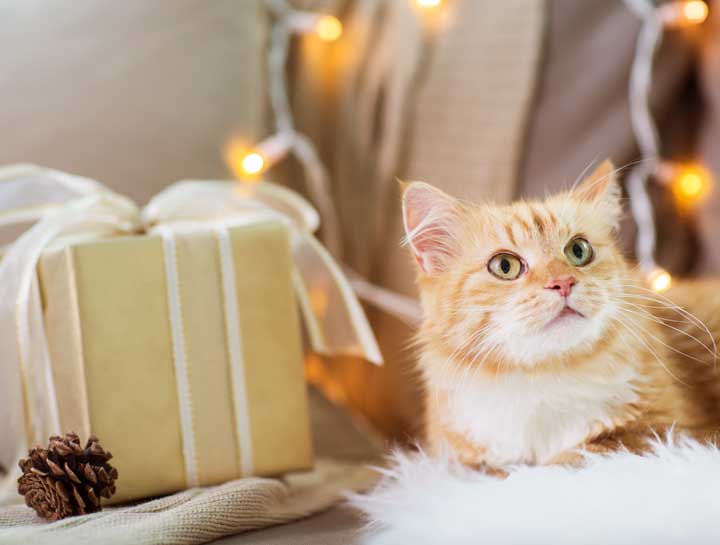Dangers for Pets Around the Holidays

December 1, 2020
It’s that time of the year and no one could be happier! The holidays are just around the corner and with everything we have been through this year, it’s about time for some cheer. Although December is usually a wonderful time for everyone sometimes it can take a toll on our lovely pets. Emergency caseloads for pets tend to increase around the holidays and it's usually for holiday-specific reasons. In this little blog, I will be pointing out some of the most common reasons for ER visits during the holiday season so that together we can keep it bright and merry for all – including our pets.
- Holiday “human” treats: Some big concerns are chocolate, xylitol (the additive in sugar-free gum or candies), and macadamia nuts (although there are many other treats of concern). If your pet gets into any of these treats it is important to call a veterinary hospital so they can induce vomiting and prevent the toxin from being further absorbed. Some symptoms that these treats can lead to are vomiting and diarrhea, agitation, tremors/seizures, difficulty walking and weakness, and possibly death in severe cases. Remember to keep all food up and away from an animal’s reach, even treats wrapped under the Christmas are not safe as dogs have a great noses!
- Toxic Holiday Plants: Common household plants around the holidays such as lilies, mistletoe, holly, and poinsettias can be toxic to pets when consumed. Depending on the plant consumed clinical signs can range from GI upset (such as increased salivation, mouth irritation, vomiting, and diarrhea), kidney failure, heart problems (change in heart rate and blood pressure), collapse, seizures, and possibly death. I recommend checking the ASPCA’s website for a list of toxic vs safe plants before adding plants into the household (https://www.aspca.org/pet-care/animal-poison-control/toxic-and-non-toxic-plants). Again, if there is any concern about your pet getting into a plant give us a call so we can discuss the necessary next steps!
- Pancreatitis: December usually means big holiday meals! It is important to understand that although you want to give your pet some leftovers off your plate for the sake of the holiday spirit it can cause them more harm than good. Pancreatitis is inflammation of the pancreas that often occurs after fatty meals or getting into the trash – and this usually goes hand in hand with Thanksgiving and Christmas. Pancreatitis leads to vomiting, diarrhea, dehydration, abdominal pain, and lethargy. These clinical signs can become life-threatening and may require hospitalization. Make sure to take the trash out often (or leave it in a cupboard or closet) and don’t feed your pets fatty leftovers no matter how tempting it may be. Instead, give them a dog or cat treat that you know is safe for them to eat.
- Electrocution: Cats of all ages and some very playful pups love to play with Christmas lights. Sadly, when they bite on the wire it can cause painful sores within the mouth and even some lung damage if the lights are plugged in. Unplug lights and cords when you are not around or too preoccupied to keep an eye on your pets to help minimize the chance of electrocution from occurring.
- Foreign Body: Tinsel and string are very common for cats to play with and accidentally ingest – this can lead to a blockage in their intestines which is life-threatening and requires emergency surgery. Dogs often have problems with eating toys or other items around the house as well. I would recommend staying away from using tinsel and making sure strings/ribbons and other items make it into a covered trashcan so pets can’t play with them and possibly eat them. Signs to look for in a possible foreign body case are frequent vomiting, lethargy, and anorexia. If you see these signs or, know your pet has eaten something that may get stuck, please give us a call so we can help decide the next steps we need to take for you and your pet.
